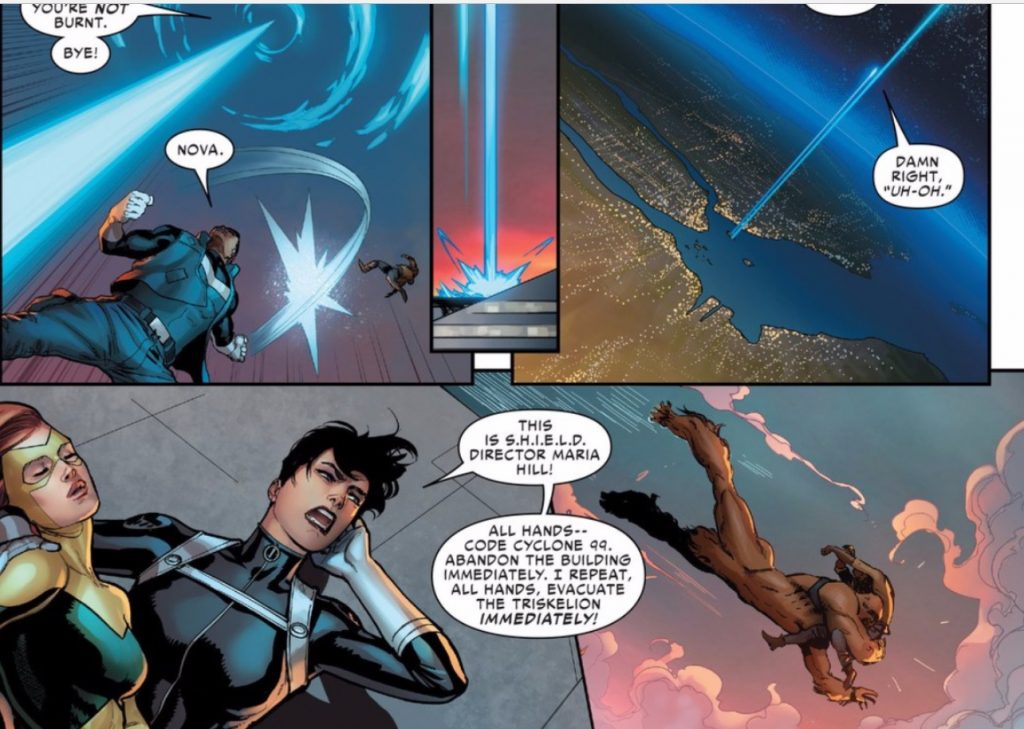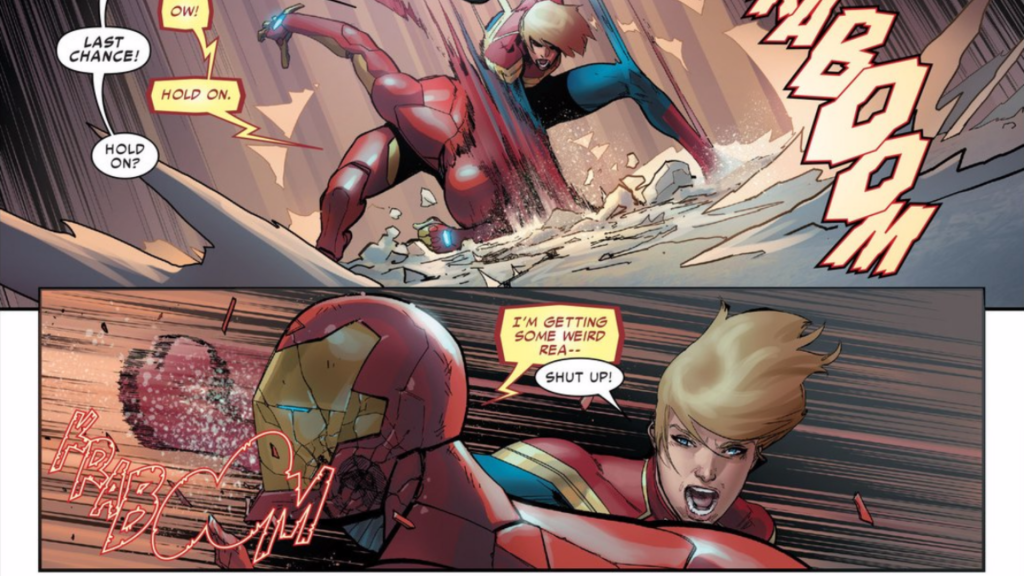SUNDAY BARBECUE: Abhay x Civil War II - Issues Five and Six
/There's a lot here to point at and snicker about. Let me try to have at least one of these be a little more coherent... Let's see how that goes!

Issues 5 and 6 definitely don't work.
The basic storytelling is not involving or exciting.
Check out this bit-- the guy in the top left corner getting hit into the sky (Luke Cage) is being snatched up at the bottom right panel by a giant random Sasquatch...? It took me a long time to figure that out because the camera is as far from the character in peril as possible for both panels-- you have no sense of Cage ever being at risk, especially because in between are characters rocketing off to outer damn space, making Cage's earth-bound difficulties seem pretty inconsequential by comparison.
The comic wants to utilize Michael Bay/MTV style edits to make the action scenes chaotic (I suppose a person could argue that the Bourne films are a likely point of reference, but this reminds me more of Bay). Now, I happen to like Michael Bay-- I know, I know-- but his kind of editing (Bayhem, or what have you) works because a pummeling visual assault just bullies you as a viewer into a peculiar kind of submission-- and you might like that, or I know a lot of people don't. But comics doing that... Comics is never anything but an active experience. So I don't know that type of technique could possibly work, even under ideal circumstances.
That said, there've been action scenes that have been chaotic in comics. Certainly manga; some Paul Pope comics come to mind.
But I think a critical difference is the lack of subjectivity to the camera, maybe. Who is the camera in this fight scene? The "camera" (for lack of a better term; the reader's POV, point of view) is just ... wherever. Are we supposed to be worried for Luke Cage? Which character's experience are we rooted in? The comic is so committed to this "Which side will you choose" marketing idea, that it can't commit to anything or else half the audience will be alienated; choices haven't been made.
If I think of a fight manga, I usually think there's a clarity in who the reader's identification character is, that doesn't get lost even if the artist might use speed lines, or weird blur smudges to convey speed or confusion...
The bigger problem may be my lack of imagination that... I just seriously can't imagine there were people saying "I'm rooting for Carol Danvers in this comic." Even among people who might support profiling because.. she's just not being presented as a legitimate point of view.
If there were pro-Danvers people, I'd think it was because of work done outside the comic, on Danvers's own series by other creators -- a pre-existing affection that this book relied on to its detriment. Because the scenes of her arguing her point are so unpersuasive-- it's just her rolling her eyes while other characters make their point.
When given a moment to engender audience sympathy, Danvers is presented as experiencing PTSD-like flashback symptoms, suggesting that even Danvers's ideology is not caused by legitimate beliefs but trauma. How can you root for trauma symptoms?
There are people who believe that profiling immigrants or others is warranted in order to deter crime and terrorism. Those people are in charge now, shit-- plenty of people support that ideology. I'm just not sure this comic is ever really making their case, is the thing. But it'd be hard to present that case without being like, "yeah, the future kid is right-- that black superhero's up to no good." That'd be a tricky place to go!
There could have been scenes early on where Carol won some arguments -- by actually preventing horrible things. But I feel like all the early scenes were Carol preventing Maybe Things while Tony Stark stood next to her yelling about how his liberal ideologies were going to be proven right by later events in this comic series.
Taking a step back... in the 4 minutes I have remaining, I think the interesting thing to ask is what were their choices?
They want to feature Carol Danvers as an interesting character. Does that to some extent require them to break the character? You know: to put her in a dramatically alive position?
It may not make her "likable" -- having not read any of the Kelly Sue work or whatever, the appeal of this character is totally lost on me right now. (She just seems like a cop-- who roots for cops??) But you know, they want to make her dramatically interesting enough that she can shoulder her half of a Civil War. How do you do that without sacrificing likability?
You know, I thought they had a hard time with Tony Stark after Civil War, but at the same time... That character got way more popular after that series, too.
They have this desire to be an exciting company for this new audience of women or whoever they're targeting -- how do you satisfy that while still putting your characters in new places, treating them like characters and not just super-fucking-boring "exemplars of goodness", not treating them like DC characters? Tricky spot to be in...
* * *
And it's 5. One last one and we wrap this up.













